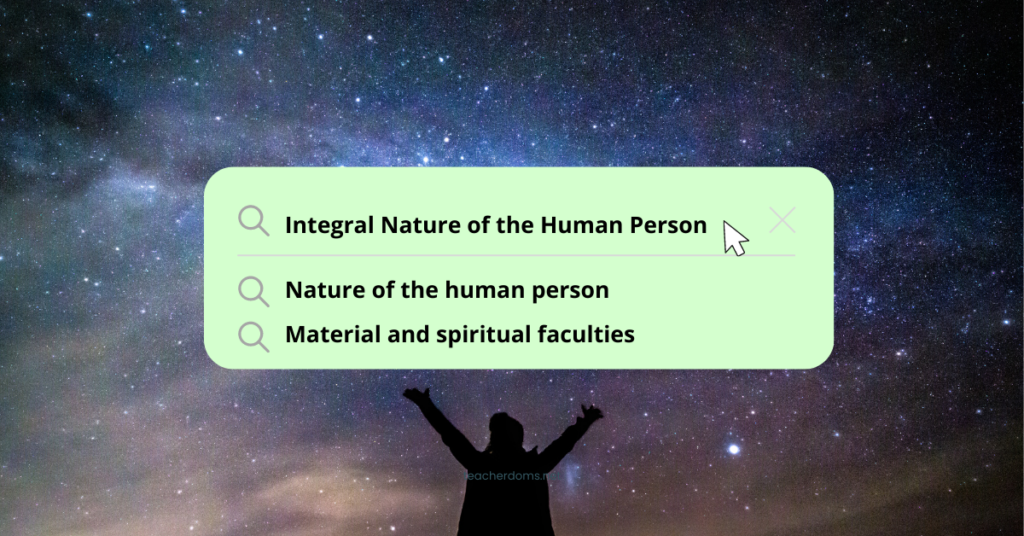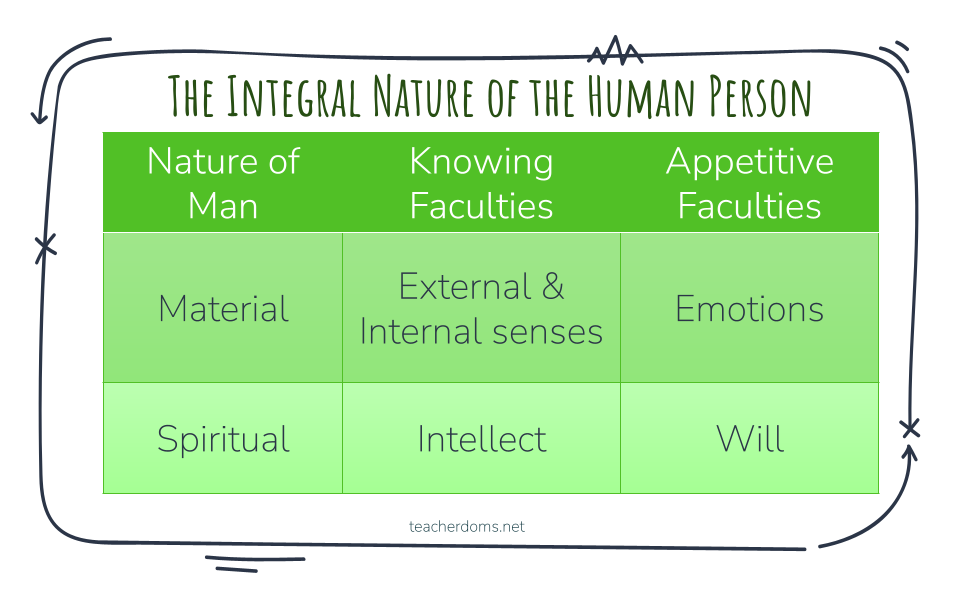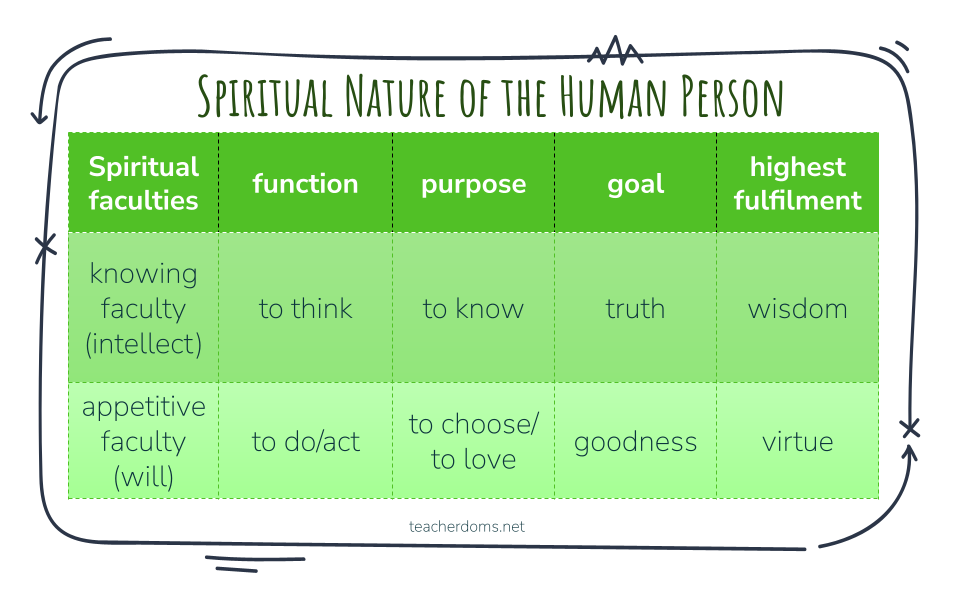
The Integral Nature of the Human Person
This is Module 3, Lesson 3: The integral nature of the human person. This forms part of the course Philosophical and Ethical Foundations of Values Education.
In Values Education, when we talk about the integral nature of the human person, we are talking about our material and spiritual faculties, which are the senses/emotions and the intellect/will faculties, respectively. Let`s study these faculties.

Our basic premise in Values Education is that, a human person is a union of body and soul, of material and spiritual. Our material nature and spiritual nature are endowed with material and spiritual faculties. They are built in to us as members of the human race.
Our Knowing faculties are sensitive and intellective (ibig sabihin gusto nitong malaman, maranasan, o maintindihan ang isang bagay or object), samantala, our appetitive faculties are unitive (ibig sabihin, gusto nitong maging united o maging kaisa sa isang bagay or object na nalaman nito or naintindihan into).
1. Material Nature of the Human Person
Now, let’s talk about our material nature. The knowing faculties are divided into external and internal senses.
Knowing Faculties
Our external senses, of course, are the 5 senses: smell, taste, touch, hearing, sight. Halimbawa: nalalaman natin na masarap pala ang chocolate dahil nalasahan natin ito; or nalaman natin na maganda sa Coron Palawan, kase nakita natin sa pictures sa social media; or nalaman mo kaya pala sikat ang Zara perfume kase naamoy mo ang bango; and so on. Thats the reason why the external senses are knowing faculties kase nagkakaroon tayo ng knowledge dahil dumadaan sila sa senses natin.
Then, we have internal senses: they are consciousness, imagination, memory, and instinct. CONSCIOUSNESS is our awareness of sensation, synthesis of external sense: or Perception. Our estimative power and common sense may already be under consciousness. IMAGINATION is the construction and reproduction of images. MEMORY is responsible for the recognition of objects in the past. INSTINCT is our tendency to do good and our inclination for well-being and our aversion to evil and danger.
Appetitive Faculties
Our appetitive faculties under material nature are emotions.
They are love, hatred, desire, aversion, joy, sorrow, hope, despair, courage, fear, and anger. They are not necessarily opposite of each other. These emotions affect our appetite for something or attraction to someone or something.
Halimbawa, kapag nararamdaman natin ang love, o pagmamahal, di ba gusto nating maging united or kaisa sa taong minamahal natin? We are drawn towards the person we love. Kapag naguumapaw ang desire or paghahangad natin sa isang bagay, gumagawa tayo ng mga paraan para makamit ito. So, our emotions influence or affect our actions.
Isa pang halimbawa, pag nalulungkot or stressed, binabaling natin ang ating atensyon sa ibang bagay, halimbawa pagkain, we unite ourselves with eating just to escape our sorrow. Nagkakaroon tayo ng mga defense mechanism kapag hindi maganda ang emotions natin. And that is normal to us human beings.
Kaya importante sa Values Education na alam ng mga istudyante kung anong dapat gawin when they feel or experience certain emotion. Kase kung hindi nila alam, emotions will destroy them. Emotions will overpower them and control them. It`s not easy, but it is possible.
Again, ang ating appetitive faculties or emotions ay nagtutulak sa atin na kamtin ang gusto natin or iwasan ang ayaw nation.
2. Spiritual Nature of the Human Person
Now, let’s talk about our spiritual nature.

Knowing Faculties
Our knowing faculty under spiritual nature is our intellect or conscience (in theological language). The function of our intellect is to think; its purpose is to know; and its goal is the truth. And don`t forget that the highest human fulfillment, as far as our spiritual knowing faculty is concerned, is Wisdom.
In Values Education, we do not stop when the students have already acquired knowledge; we push them and we help them turn their knowledge into wisdom. And wisdom should not remain abstract in the life of our students. It should not be complicated. It must be concrete and doable.
Halimbawa, hindi sapat na ituro lang natin sa mga bata na dapat alagaan ang kapaligiran o kalikasan. Kailangan nating matiyak na gagawa sila ng mga kongkreto at simpleng hakbang sa bahay o sa komunidad nila na nagpapakita ng pag-aalaga sa kalikasan or environmental care.
Ang wisdom na tinutukoy natin dito sa Values Education (maliban sa theological Wisdom) is the manifestation and practice of the core values and the related values under physical dimension, intellectual dimension, moral, social, spiritual, economic, and political. Those core values and related values are discussed under the course Legal Basis of Values Education: The 1997 Values Education Framework.
Appetitive Faculties
Let`s go now to appetitive faculty under spiritual nature.
Our appetitive faculty here is the will. Its function is to do or to act; its purpose is to choose and to love; and its goal is goodness. Do not forget that the highest human fulfillment, as far as our spiritual appetitive faculty is concerned, is a virtue.
In Values Education, our duty is to direct our students to what is good, to choose the good, to love, and to act in accordance with our moral standards or virtues. Why do we teach this? Well, that’s because it’s not easy. Especially among our teenage students, when passions and emotions are stronger, they tend to divert from what we consider morally good. Kaya tinuturuan natin sila kung paano nila i-handle ang buhay nila.
We teach values they can use as their moral compass towards what is really good, or the Supreme Goodness, or the Ultimate Good, who is God Himself. Halimbawa, hindi lang natin itinuturo kung ano ang freedom at responsibility. Higit sa lahat, itinuturo natin ang kahalagan ng tamang pagsasabuhay ng kalayaan na makakatulong sa paglago ng kanilang pagkatao at sa pagkatao ng iba.
So sa Values Education, ang target natin ay maging consistent at constant ang pagsasabuhay ng virtues na naka-ugat sa ating core values and related values. Bakit? Dahil ito ang magiging daan patungo sa ating goal na goodness… and ultimately, to the Supreme Good Himself (the God we believed in).
So those are the integral nature of the human person. We consider the material and spiritual natures of the human person, and their knowing and appetitive faculties.
To recap, we talk about the integral nature of the human person. We talked about the faculties under the material and spiritual natures. Under the material nature, the knowing faculties are the external senses and the internal senses, while the appetitive faculties are the emotions. Under the spiritual nature, the knowing faculty is the intellect, while the appetitive faculty is the will.
That’s module 3, Lesson 3, the integral nature of the human person.
For other modules in this course (Philosophical and Ethical Foundations of Values Education), check the links below:
Module 1: Introduction
Module 2: Philosophies of Man
Module 3: Human Nature
REFERENCES:
- Agapay, Ramon B. 1991. Ethics and the Filipino, A Manual on Morals for Students and Educators. Mandaluyong City: National Bookstore, Inc.
- De Torre, Joseph M. 1980. Social Morals. The Church Speaks on Society. Manila: Southeast Asian Science Foundation, Inc.
- Esteban, Esther J. 1990. Education in Values: What, Why, and For Whom. Manila: Sinag-tala Publishers, Inc.
- Farrel, Walter, O.P. and Haly, Martin J. 1952. My Way of Life. USA. Confraternity of the Precious Blood.
- Lipio, Felicidad C.O.P. 1998. Conscience: A Catholic Filipino View: Manila: St. Paul’s Philippines.
- Morga, Michael D. S.J. 1993. Toward Authentic Morality: An Ethics Textbook for Philippines. Manila: National Bookstore, Inc.
- Montemayor, Felix M. 1994. Ethics: The Philosophy of Life. Manila: National Bookstore, Inc.
- Peschke, Karl H. S.V.D. 1996. Christian Ethics: Moral Theology in the Light of Vatican II. Manila: Divine World Publications.
- Reyes, Ramon C. 1989. Ground and Norm of Morality: Ethics for College Students. Manila: Ateneo de Manila University Press.
- Rice, Charles E. 1996. 50 Questions on the National Law: What It Is and Why We Need It? San Francisco, Ignatius Press.